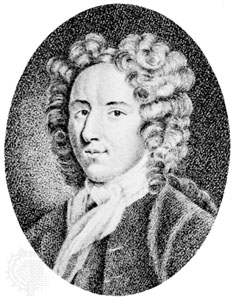“I hate all that don’t love me, and slight all that do.”
The Constant Couple (1699), Lure, Act i, Sc. 2.
George Farquhar – angielski dramaturg pochodzenia irlandzkiego.
Był jednym z najwybitniejszych autorów komedii epoki restauracji. W swojej twórczości zrezygnował z tradycyjnego lokowania miejsca akcji w Londynie oraz wprowadził postacie z różnych warstw społecznych, reprezentujących prowincjonalne społeczeństwo. Intrygę w swoich dziełach opierał na wyraźnie zarysowanym motywie miłości romantycznej.
Wikipedia

“I hate all that don’t love me, and slight all that do.”
The Constant Couple (1699), Lure, Act i, Sc. 2.
“I believe they talked of me, for they laughed consumedly.”
The Beaux’ Stratagem (1707), Act iii. Sc. 1.
“Necessity, the mother of invention.”
The Twin Rivals (1702), Act i. Compare: "Necessity is the mother of invention", Wycherly, Love in a Wood (1672), act iii. sc. 3.; "Art imitates Nature, and necessity is the mother of invention", Richard Franck, Northern Memoirs (written in 1658, printed in 1694); "Magister artis ingenique largitor Venter" (translated: "Hunger is the teacher of the arts and the bestower of invention"), Persius, Prolog., line 10.
“T was for the good of my country that I should be abroad.”
The Beaux’ Stratagem (1707), Act iii. Sc. 2. Compare: "Leaving his country for his country’s sake", Fitz-Geffrey, The Life and Death of Sir Francis Drake (1596), stanza 213.; "True patriots all; for, be it understood, / We left our country for our country’s good", George Barrington, Prologue written for the opening of the Play-house at New South Wales, Jan. 16, 1796. New South Wales, p. 152.
“There is no scandal like rags, nor any crime so shameful as poverty.”
The Beaux’ Stratagem (1707), Arch, Act i, Sc. 1.
“Hanging and marriage, you know, go by destiny.”
The Recruiting Officer (1706), Braz, Act iii, Sc. 2.
“[T]hose who know the least, obey the best.”
The Recruiting Officer (1706), Act iv. Sc. 1.
Love and a Bottle (1698), Act iii, Sc. 2.